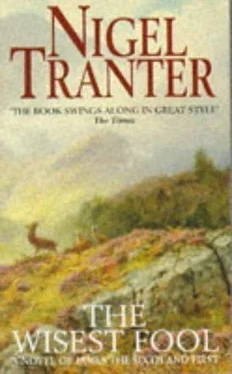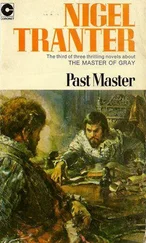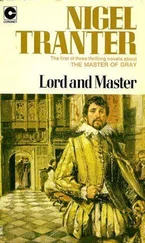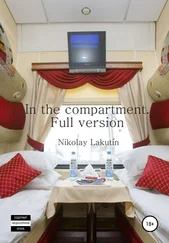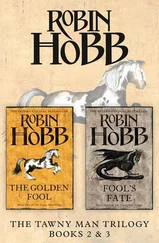Nigel Tranter - The Wisest Fool
Здесь есть возможность читать онлайн «Nigel Tranter - The Wisest Fool» весь текст электронной книги совершенно бесплатно (целиком полную версию без сокращений). В некоторых случаях можно слушать аудио, скачать через торрент в формате fb2 и присутствует краткое содержание. Жанр: Исторические приключения, на английском языке. Описание произведения, (предисловие) а так же отзывы посетителей доступны на портале библиотеки ЛибКат.
- Название:The Wisest Fool
- Автор:
- Жанр:
- Год:неизвестен
- ISBN:нет данных
- Рейтинг книги:4 / 5. Голосов: 1
-
Избранное:Добавить в избранное
- Отзывы:
-
Ваша оценка:
- 80
- 1
- 2
- 3
- 4
- 5
The Wisest Fool: краткое содержание, описание и аннотация
Предлагаем к чтению аннотацию, описание, краткое содержание или предисловие (зависит от того, что написал сам автор книги «The Wisest Fool»). Если вы не нашли необходимую информацию о книге — напишите в комментариях, мы постараемся отыскать её.
The Wisest Fool — читать онлайн бесплатно полную книгу (весь текст) целиком
Ниже представлен текст книги, разбитый по страницам. Система сохранения места последней прочитанной страницы, позволяет с удобством читать онлайн бесплатно книгу «The Wisest Fool», без необходимости каждый раз заново искать на чём Вы остановились. Поставьте закладку, и сможете в любой момент перейти на страницу, на которой закончили чтение.
Интервал:
Закладка:
George Heriot was not in the royal train this time-although he was not far away. With the Queen's affairs now all safely in Lennox's hands he had left Linlithgow a week earlier for Edinburgh to look to his own affairs-and not before time. His half-brother James Heriot was industrious, honest and efficient, but rather lacked the imagination and instinct necessary for really successful dealings with the nobility and aristocracy, where judgment, tact and yet a kind of ruthlessness, were absolutely essential. The move to London, temporary or permanent, on the part of so many of their clients, was making enormous demands on the Heriot's finances, as noble families sought to equip, clothe and adorn themselves to compete at the richer English Court, pay for their long journey, and buy or lease houses in London. A great tide of Scots was flowing southwards, hopeful of making fortunes-but they had to be staked; and the Heriots were themselves having to borrow money on every hand, at high rates of interest, to be able to lend it again at still higher. Disaster could strike so very easily if judgment failed and money was lent to the wrong borrowers. Land, of course, was the great security; and Jmglin' Geordie was in process of becoming one of the great landowners of Lowland Scotland, more by accident than design.
Heriot was waiting at the West Port, behind the Provost and Council-one of whom was brother James, representing the Incorporation of Goldsmiths and Hammermen. Mary Gray spotted him while the address of welcome was going on, and with tableaux to follow and prolonged delay inevitable, dismounted and slipped from her place at the Master's side-she would not ride with Ludovick, of course, the Duchess being present.
"So, Geordie," she greeted, "you came to watch the show. It is good to see you." She had to shout to be heard above the bombilation of the cannon-fire from the castle directly above. "And you. You are the fairest thing I have seen in seven days I"
"Tut-Geordie Heriot essaying flattery. Why? Do not say that you need Mary Gray? Did you get my message? About the new Queen's ladies?"
"Yes. I sent word to have them held at Berwick Though I think that will scarce be popular. But, if there is to be trouble, let it be over the Border. Where, h'm, trouble-makers cannot add to it!"
"That makes good sense. The Queen is adamant. She will have no more ladies save of her own choosing. Especially English ones."
"It will be difficult James has sent up the Earls of Sussex and Lincoln with this bevy of countesses and the like. Carefully chosen to play faction against faction, the Cecils against the Howards, Cobham against Raleigh. The old game he learned so well here in Scotland. Nullifying their influence."
"So Vicky told the Queen. But she will have none of it. James can make a political tourney-ground of his own Court, she says- but not of her's. A plague on them all, says Anne! This period away from the King has made her a deal more independent, to be sure. She is a changed woman." "Scarcely a joyful augury for London!"
They fell silent for the Queen's brief speech of thanks, almost inaudible because of the gunfire. Then the tableaux commenced, angels presenting keys, elves offering gifts, a dragon spewing claret and other typically leaden municipal flights of fancy. At least there were no Latin monologues, de rigueur when the King was present
At last they could move on to Holyrood-although there were further but briefer ceremonies en route, to each of which the Queen listened and responded with unvarying and courteous patience, very different from her royal husband who would have been cursing all angrily long before this.
"Think you that Anne has discovered that perhaps the people's love and esteem can be a thing of value?" Heriot wondered. "She did not used to be so patient"
Holyroodhouse was a different place from Heriot's last experience of it. All was formally correct, decorous, tidy. The guard was evident, punctilious, the staff attendant, discreet Even Heriot’s quarters in the wing had been cleaned up, with some fresh skin rugs and new hangings and items of furniture. The Master of Gray clearly did not do things by halves. The Lord Lindores seemed to have disappeared.
There followed some days of hectic activity for the royal entourage, in preparation for the great journey to London. Anne was now determined to enjoy the experience and to travel in a style worthy of her position-whatever more modest arrangements Lennox had envisaged, on the King's instructions. The Queen had no idea of economy, and finding herself suddenly in a strong position, with Lennox having a viceroy's powers yet unwilling to say her nay, spent money like water. That it was in the main George Heriot's money, since the Scots Exchequer was emptier than ever after Gray's extravagances, was neither here nor there. That she was egged on to a great spending by the Master of the Wardrobe went almost without saying. She ordered night-and-day work on a most splendid travelling coach to be completed by George Hendry, bought scores of the finest horses to be found in Scotland, and embarked on an orgy of clothes-buying for herself, her children, her ladies and servants. Nothing was too good or too expensive-satins, silks, taffetas, cloth-of-gold and silver, furs, jewellery and accessories. It was all, undoubtedly, partly a counter-gesture after the sorrows of Linlithgow and partly a making of hay while the sun of her husband's absence shone, and his restraining hand was replaced by Cousin Ludovick's easy one.
To be sure, James had partly himself to thank for it all. Queen Elizabeth, parsimonious on most matters to the point of meanness, had been wildly extravagant as to her own personal adornment, and had left behind her, amongst other things, more than two thousand splendid gowns. The King had promptly commandeered a selection of these and sent them up, with his choice of English ladies-in-waiting, for his wife. Anne's reaction had been, perhaps predictable, exploding in a feminine fury anent cast-off clothing, insults and the like-with the consequence of Heriot's urgent instructions for the English ladies and their escort to be halted at Berwick meantime.
Heriot’s own reaction to this spending was ambivalent He sympathised with his liege lord in the South to some extent, and put in a word of caution now and again, countering the wildest flights of prodigality. On the other hand, he felt for Anne, recognised that to date she had been sorely crimped and held in, and agreed that a queen entering her new and rich domains for the first time should be adequately dressed for the occasion. Also, of course, it was all apt to be good business for himself, a point of view he by no means overlooked. It might be some time before he recovered all his capital-but he would see that it was safe and the interest proportionate.
At last the coach was ready and a start could be made. On a sunny forenoon of early June, the great cavalcade assembled in the forecourt of the palace, with the Chancellor, the Lord Lyon and remaining Privy Councillors and officers of state, the leaders of the Kirk, the city fathers of Edinburgh and a large part of the townsfolk, there to see the Queen and Prince off to a new life in England-the Princess Elizabeth was unfortunately confined to her bed with some sudden childish ailment and would follow on later; while Prince Charles was still at Dunfermline, considered too weakly for the long journey.
It was a felicitous occasion. None would have thought that, only a few weeks before, the country had been in the throes of a dynastic crisis and treasonable plot combined, moreover with all the main characters concerned here foregathered-except the Mars, that is, the Earl having ridden off alone to London, to ensure that he got his own story first into his royal foster-brother's ear.
Lord Fyvie made a valedictory speech, ending with a short poem he had composed especially for the day-it was not every Chancellor who could do the like. Then the Master of Gray presented parting gifts for the Queen and her children, jewellery, loving-cups and silver caskets, expressing in flowing eloquence the warm regards and true love of all, including his most humble self, for their royal mistress and her delightful offspring, and their pro-foundest good wishes for the future-praying only that in the new-found bliss in the South they would not forget leal and loving Scotland.
Читать дальшеИнтервал:
Закладка:
Похожие книги на «The Wisest Fool»
Представляем Вашему вниманию похожие книги на «The Wisest Fool» списком для выбора. Мы отобрали схожую по названию и смыслу литературу в надежде предоставить читателям больше вариантов отыскать новые, интересные, ещё непрочитанные произведения.
Обсуждение, отзывы о книге «The Wisest Fool» и просто собственные мнения читателей. Оставьте ваши комментарии, напишите, что Вы думаете о произведении, его смысле или главных героях. Укажите что конкретно понравилось, а что нет, и почему Вы так считаете.
